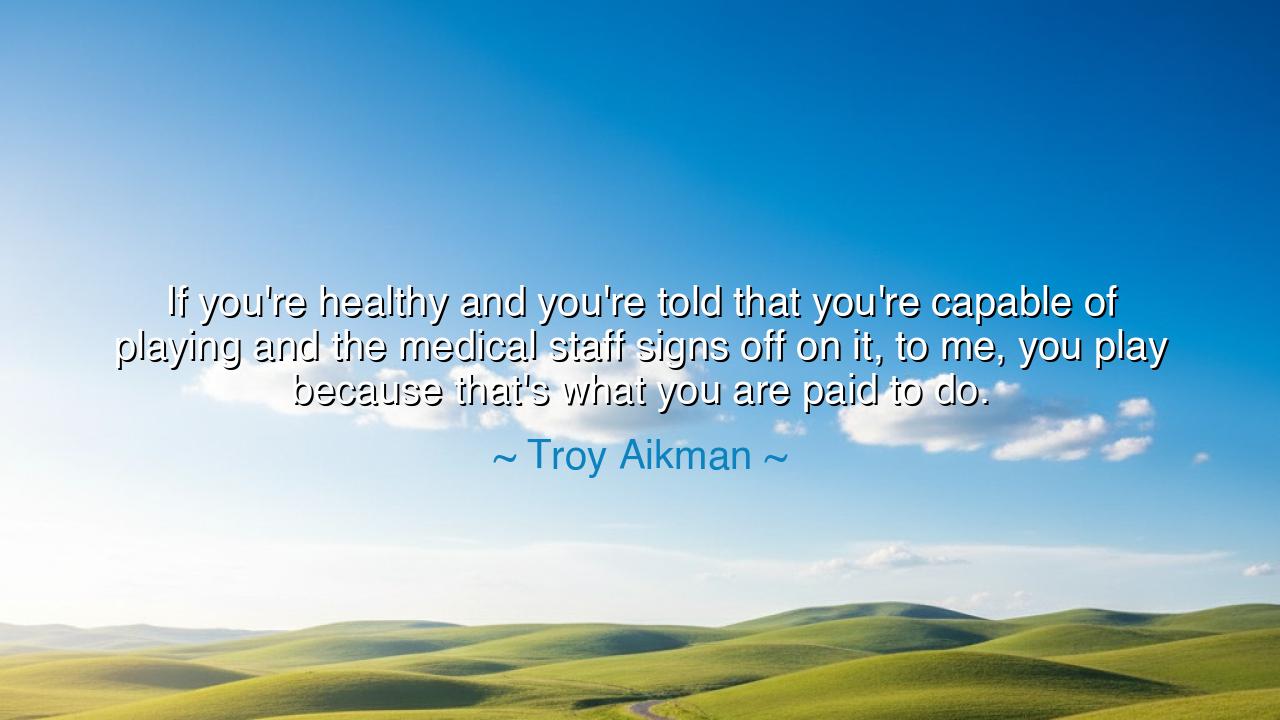
If you're healthy and you're told that you're capable of playing
If you're healthy and you're told that you're capable of playing and the medical staff signs off on it, to me, you play because that's what you are paid to do.






“If you’re healthy and you’re told that you’re capable of playing and the medical staff signs off on it, to me, you play because that’s what you are paid to do.”
Thus spoke Troy Aikman, warrior of the gridiron, leader of men, and champion forged in the roaring crucible of the NFL. His words, though spoken in the realm of sport, carry the eternal rhythm of duty, honor, and responsibility. In them, we hear the voice of one who has lived by the code of the battlefield — the belief that when one is entrusted with a task, and when the body and mind are judged ready, one must rise, not hesitate. For Aikman’s creed is not merely about football; it is a reflection on commitment — the sacred bond between one’s calling and one’s character.
The origin of this quote lies in the culture of professional sport, where physical pain and endurance are constant companions. As the legendary quarterback for the Dallas Cowboys, Aikman was no stranger to injury. He played through broken bones, concussions, and bruises that would have humbled lesser men. Yet, in his era, to step onto the field despite hardship was not just valor — it was duty. Players were taught that when the doctors cleared them, when their strength was deemed sufficient, they must answer the call without hesitation. It was an unwritten oath: if you can stand, you fight. If you can play, you play.
In his statement, Aikman speaks not of recklessness, but of responsibility. He acknowledges the balance between wisdom and courage: that one should heed the medical judgment, that one should not act against reason, but once deemed fit, there is no room for fear or self-pity. His words mirror the ancient ethos of the warrior — that to be chosen for a task is to bear it fully. The soldier, once armed and ready, does not linger at the campfire when the trumpet calls. The farmer, once the season turns, does not delay the plowing. So too, the athlete, once cleared to play, must take the field — not for glory alone, but for the honor of fulfilling his duty.
This principle has been echoed throughout history. Consider the story of Horatius Cocles, the Roman soldier who, though wounded, stood alone on the bridge to defend Rome from invaders. His comrades urged him to retreat, yet he said, “So long as I can stand, I fight.” When asked why he did not rest, he answered that he was a Roman, and to fight for Rome was his purpose. His wounds, though great, were not as heavy as his duty. Troy Aikman’s sentiment flows from the same ancient stream — that to be entrusted with a role, to be compensated for one’s craft, is to shoulder it with courage and integrity. Work is not just a livelihood; it is an oath.
Yet there is in his words also a reflection of modern virtue — the idea of professionalism. Aikman reminds us that excellence demands consistency. To perform only when convenient, to serve only when comfortable, is to betray the sacred covenant between effort and reward. In every craft, there are moments when fatigue whispers its deceit, when comfort tempts the heart to retreat. But the true professional — whether athlete, soldier, teacher, or laborer — knows that once he is able, he must stand and fulfill his role. Discipline is the bridge between readiness and greatness.
Still, Aikman’s wisdom is not without caution. It is a call to strength, not to folly. He honors the voice of the medical staff, the modern equivalent of the ancient healer, whose judgment separates courage from recklessness. To play while fit is bravery; to play while broken is pride. His words remind us that wisdom and valor must walk together, that duty is best served when both the heart and the body align. He does not glorify pain for its own sake; he glorifies the honor of rising when you can, and resting when you must.
And so, the lesson of Troy Aikman’s quote is this: duty fulfilled is the truest measure of integrity. When you are capable, you must act. When you are entrusted with a task, you must honor it with your full strength. The world rewards those who rise when called, who give their best not only in triumph but also in toil. Whether your field is the stadium, the office, or the classroom, live by this creed — when you are able, give fully; when cleared to serve, serve wholly. For in the end, the worth of a person is not found in what they avoid, but in what they commit to with steadfast heart.
Thus, let Troy Aikman’s words echo through the generations as a call to responsibility and resilience. When life’s physicians — whether literal or metaphorical — declare that you are strong enough to play, do not linger in doubt. Step forward. Stand firm. Do the work for which you are called. For in every act of duty performed with courage, the spirit of the ancient warrior lives on — proving that even in the quiet arenas of the modern age, honor still has its champions.






AAdministratorAdministrator
Welcome, honored guests. Please leave a comment, we will respond soon